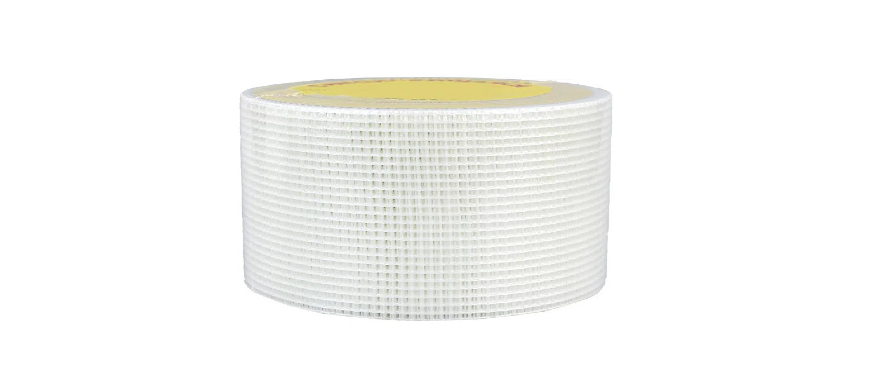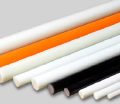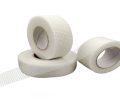
Fine fiberglass mesh is a highly durable and versatile material used across multiple industries. It is composed of finely woven glass fibers, making it lightweight yet strong, with high tensile strength that provides structural integrity. Fine fiberglass meshes is known for its durability and resistance to environmental stresses such as temperature extremes and moisture, making it ideal for demanding applications. Fine fiberglass meshes is a type of fabric made from woven glass fibers. It is characterized by its excellent tensile strength, flexibility, and resistance to corrosion, making it an essential component in various construction and industrial processes. Fine fiberglass mesh plays a crucial role in many sectors, particularly in construction. It is widely used in concrete reinforcement, providing additional strength and preventing cracking. It is also used in waterproofing systems, plastering, and as a base material for other construction applications like insulation and facades. Its ability to withstand stress and harsh environments makes it invaluable for long-lasting, high-performance structures.
Fine Fiberglass Mesh for Concrete Reinforcement
Fine fiberglass meshes is a crucial material for reinforcing concrete structures, offering superior strength and flexibility. It plays a vital role in enhancing the durability and longevity of concrete, making it an ideal choice for various construction applications. The mesh is embedded within the concrete, providing uniform reinforcement and improving the material’s overall performance.
Reinforcing Concrete
Fine fiberglass meshes enhances concrete structures by increasing their resistance to cracking and improving the distribution of stress. It is designed to be embedded within concrete during mixing or placed within concrete slabs, where it helps to evenly distribute the weight and force that the structure experiences. This prevents the formation of cracks and increases the overall integrity of the concrete.
Benefits in Concrete Work
Fine fiberglass mesh offers several key advantages when used in concrete reinforcement:
- Crack Resistance: Fine fiberglass meshes helps to reduce the likelihood of cracks forming in concrete by distributing stress evenly, enhancing the overall strength and durability of the structure.
- Durability: The inherent properties of fiberglass mesh make it highly resistant to moisture, chemicals, and extreme temperatures, ensuring that it remains strong and effective over time.
- Cost-Effectiveness: Using fine fiberglass meshes reduces the need for traditional steel reinforcement bars, offering a more affordable solution for reinforcing concrete without compromising on strength.
- Improved Structural Integrity: By enhancing the load-bearing capacity of concrete and providing crack resistance, fine fiberglass meshes significantly improves the structural integrity of concrete components, making them safer and more reliable.
Applications
Fine fiberglass meshes is used in a wide range of concrete applications, especially where durability and long-term performance are essential. Some of the most common applications include:
- Driveways: It is used in residential and commercial driveways to ensure even stress distribution and to prevent cracking caused by vehicular load.
- Pavements: Fine fiberglass mesh is employed in pavements to provide strength and prevent surface degradation from weather and heavy foot traffic.
- Reinforced Concrete Walls: It is often incorporated into concrete walls to enhance their structural integrity, helping them withstand external pressures and environmental factors.
Fine fiberglass meshes for concrete reinforcement offers numerous advantages in terms of durability, crack resistance, and cost-efficiency. Its ability to enhance the overall strength of concrete structures makes it a valuable material for various construction projects, ensuring long-lasting, high-performance results.
Fiberglass Lamination for Marine & Automotive
Fine Fiberglass Mesh for Waterproofing
Fine fiberglass mesh is an essential component in modern waterproofing systems, providing enhanced protection against water infiltration and moisture damage. By incorporating fine fiberglass meshes into waterproofing applications, both residential and commercial structures can benefit from improved durability, longevity, and resistance to the effects of water exposure. The mesh acts as a reinforcement layer, improving the overall performance of waterproofing systems and ensuring long-term protection.
Waterproofing Applications
Fine fiberglass mesh is commonly used in waterproofing systems for a variety of applications, including floors, walls, and roofs. It is embedded within liquid waterproofing membranes or placed as a reinforcement layer under waterproof coatings. This helps ensure that the waterproofing material adheres more effectively and provides a uniform surface that prevents cracks and leaks. By reinforcing the membrane, the fine fiberglass meshes helps the waterproofing system maintain its integrity under pressure from water.
- Floors: Fine fiberglass meshes is used in waterproofing floors, particularly in basements, bathrooms, and other areas prone to water exposure. It strengthens the waterproofing layer, ensuring that the floor remains dry and resistant to moisture damage.
- Walls: For walls, especially in below-grade construction, fine fiberglass meshes enhances the waterproofing system’s resistance to water infiltration, reducing the risk of water seeping into the foundation or walls.
- Roofs: In roofing systems, fine fiberglass mesh is used to provide additional reinforcement to waterproofing membranes, preventing leaks and improving the overall strength of the roof under harsh weather conditions.
Moisture Protection
The primary role of fine fiberglass meshes in waterproofing is to prevent water infiltration, which is crucial in maintaining the structural integrity of buildings. By reinforcing the waterproof membrane, the mesh provides a barrier that stops water from seeping into vulnerable areas of the structure. This moisture protection reduces the risk of damage caused by water, such as:
- Mold and Mildew Growth: The presence of water can lead to the growth of mold and mildew, which can deteriorate materials and pose health risks. Fine fiberglass mesh helps keep surfaces dry by preventing water from penetrating, significantly reducing the chances of mold and mildew formation.
- Structural Damage: Constant water exposure can weaken building materials, causing cracks and deterioration over time. The mesh adds extra strength to the waterproofing layer, safeguarding the structural integrity of walls, floors, and roofs.
Durability
Fine fiberglass mesh offers exceptional durability, especially in environments where extreme weather conditions or constant water exposure are common. The mesh is highly resistant to moisture, UV rays, and temperature fluctuations, ensuring that it remains intact and effective over time. Its durability makes it ideal for use in both indoor and outdoor waterproofing applications, where long-lasting performance is critical.
- Long-Lasting Performance: The mesh provides a robust reinforcement layer that resists wear and tear over time, ensuring that the waterproofing system remains intact and functional throughout its lifespan.
- Extreme Weather Resistance: Fine fiberglass mesh is particularly valuable in areas exposed to extreme weather conditions, such as heavy rain, snow, or high humidity, as it ensures that the waterproofing system continues to perform effectively under these challenging conditions.
Fine fiberglass mesh plays a crucial role in waterproofing applications by enhancing moisture protection, preventing water infiltration, and increasing the durability of waterproofing systems. Its ability to withstand harsh conditions and provide long-lasting performance makes it an essential material for ensuring the integrity of buildings exposed to water or moisture.
Real-World Fiberglass Rebar Case Studies in Construction Projects
Fine Fiberglass Mesh and Fiberglass Mesh Cloth in Construction: Applications and Benefits
Fine fiberglass mesh cloth is a highly versatile material used extensively in the construction industry for its reinforcement properties. This cloth is woven from fine fiberglass threads to create a durable, flexible mesh that provides structural integrity and improves the longevity of various building materials. Its applications range from plastering to tile backing and more, making it an indispensable tool for construction professionals.
Fiberglass Mesh Cloth
Fine fiberglass mesh cloth is created by weaving fine fiberglass fibers into a grid pattern, forming a fabric that is lightweight yet incredibly strong. The mesh structure provides excellent tensile strength, which helps distribute stress evenly across the surface. This makes the mesh ideal for reinforcing materials like plaster, drywall, and stucco, ensuring that these materials remain intact and free from damage under various environmental and mechanical stresses.
The fine fiberglass mesh cloth offers several advantages in construction due to its combination of strength, flexibility, and ease of application. It serves as a dependable reinforcement material that enhances the durability and functionality of the construction materials it supports.
Plastering Uses
In plastering, fine fiberglass mesh cloth plays a critical role in reinforcing the plaster and preventing cracking. When applied under the plaster layer, the mesh helps distribute stress evenly, reducing the risk of shrinkage cracks or structural damage that can occur during the curing process. It is particularly valuable in areas that are prone to movement or settling, such as drywall joints or exterior stucco finishes.
- Preventing Cracks in Plaster: Fine fiberglass mesh cloth is often used to prevent cracking in plaster applications, especially in walls and ceilings. The mesh provides a stable foundation for the plaster to adhere to, ensuring that it remains intact even under stress.
- Stucco Applications: In stucco applications, the fiberglass mesh cloth is embedded in the first layer of stucco, creating a durable bond that reinforces the stucco and prevents cracking due to temperature fluctuations and moisture exposure.
Easy Application
Fine fiberglass mesh cloth improves the adhesion and longevity of various construction materials, making it an essential component in the building process. Its flexible and lightweight nature makes it easy to apply, even in intricate or hard-to-reach areas, ensuring uniform coverage. Additionally, the mesh allows construction materials to bind more effectively to surfaces, resulting in a stronger bond that increases the durability of the finished structure.
- Improved Adhesion: The mesh creates a stronger bond between layers of plaster, drywall, stucco, and other materials, ensuring that the finished product is more durable and less likely to deteriorate over time.
- Enhanced Longevity: Fine fiberglass mesh cloth enhances the long-term performance of building materials, reducing maintenance needs and extending the lifespan of walls, ceilings, and other surfaces.
Fine fiberglass mesh cloth is a valuable reinforcement material used in various construction applications. Its ability to prevent cracks, improve adhesion, and enhance the durability of plaster, stucco, and drywall makes it a vital component for ensuring the longevity and structural integrity of buildings. Whether used for plastering, tile backing, or other construction needs, fine fiberglass mesh cloth provides unmatched strength and reliability in the construction industry.
Fiberglass Rebar Couplers: Advantages and Installation Guide
Fine Fiberglass Mesh for Boats
Fine fiberglass mesh plays a vital role in the construction and repair of boats, offering strength, durability, and resistance to the harsh conditions typically encountered in marine environments. Its versatile properties make it an essential material in reinforcing boat hulls and other structural elements, ensuring that boats can withstand the pressures of water and time. Fine fiberglass mesh is used not only in new boat builds but also in boat repair, providing long-lasting, reliable results.
Marine Use
Fine fiberglass mesh is commonly used in boat construction and repair for its exceptional reinforcing properties. The mesh is woven from high-strength fiberglass fibers, creating a grid pattern that provides both flexibility and structural support. In boat hulls, the mesh is often incorporated into layers of resin to enhance the integrity of the structure and ensure the boat can withstand external forces like waves, impacts, and pressure from rough water conditions.
- Boat Hulls: Fine fiberglass mesh is typically embedded in resin or fiberglass layers on the hull, adding strength without adding significant weight. This ensures a sturdy and lightweight structure that is critical for optimal performance on water.
- Repairs: Fine fiberglass mesh is also used in boat repair, particularly for reinforcing damaged or weakened areas in the hull. When combined with resin, the mesh helps restore the boat’s original strength, preventing further damage.
Benefits for Boats
Fine fiberglass mesh offers several key advantages when used in boat construction and repair. It is highly effective at strengthening the boat’s hull and enhancing its overall performance on water.
- Strengthening the Hull: Fine fiberglass mesh increases the strength of the boat’s hull by providing a solid reinforcement that helps it resist external forces, such as collisions or impact from underwater obstacles.
- Resisting Corrosion: The fiberglass mesh material is highly resistant to corrosion, making it ideal for marine environments where saltwater exposure can damage other materials. This resistance helps preserve the boat’s structure over time.
- Providing Structural Integrity: By distributing stress evenly across the hull, fine fiberglass mesh helps maintain the boat’s structural integrity, reducing the likelihood of cracks or fractures that may otherwise compromise the vessel.
Water Resistance
One of the most important characteristics of fine fiberglass mesh is its ability to resist moisture, which is crucial for marine applications. Boats are constantly exposed to water, and any material used in their construction must be able to handle prolonged moisture exposure without deteriorating. Fine fiberglass mesh excels in this aspect by providing water resistance that ensures the mesh and the overall structure of the boat remain intact.
- Moisture Resistance: The fiberglass material does not absorb water, preventing it from weakening or becoming compromised when exposed to the harsh marine environment.
- Durability in Harsh Environments: The mesh maintains its strength and integrity even in environments subject to high humidity, saltwater exposure, and temperature fluctuations.
Fine fiberglass mesh is an essential material for boat construction and repair. Its ability to strengthen boat hulls, resist corrosion, and provide long-lasting water resistance makes it a valuable asset in marine applications. Whether constructing a new vessel or repairing an existing one, fine fiberglass mesh ensures that boats remain durable, reliable, and capable of withstanding the challenges of the water.
Fine Fiberglass Mesh and Resin
The combination of fine fiberglass mesh and resin is a powerful duo that enhances the strength, durability, and flexibility of various materials used in different industries. Fine fiberglass mesh, known for its high tensile strength and lightweight nature, is often used in conjunction with resin to create strong, reliable composite materials. This combination provides a superior solution for applications that require enhanced structural integrity and resistance to environmental factors.
Combination with Resin
Using fine fiberglass mesh in conjunction with resin is essential for reinforcing and strengthening various materials. The resin acts as a bonding agent that helps the mesh adhere to surfaces, while the fine fiberglass mesh adds structural support, flexibility, and resistance. Together, these components create a composite material that is much stronger than resin or fiberglass mesh alone.
- Strength and Flexibility: Resin, when combined with fine fiberglass mesh, helps create a flexible yet highly durable material. The resin ensures that the mesh remains bonded to the surface, preventing delamination or separation under stress, while the mesh enhances the material’s ability to bend without breaking.
- High-Performance Materials: The combination of fine fiberglass mesh and resin is ideal for creating high-performance materials. This blend provides excellent reinforcement for lightweight structures that need to withstand heavy loads, impacts, or environmental conditions.
Common Uses
The combination of fine fiberglass mesh and resin is widely used in various industries to create strong, durable composite materials. The ability to customize the resin and mesh to specific applications makes this combination highly versatile. Some common uses include:
- Boat Hulls: Fine fiberglass mesh reinforced with resin is commonly used in boat hulls to provide additional strength and resistance to the harsh marine environment. This material is ideal for withstanding water pressure, impacts, and weathering while remaining lightweight and flexible.
- Surfboards: Surfboard manufacturers often use fine fiberglass mesh and resin to enhance the strength and durability of the board. The mesh reinforces the board’s core and helps maintain its shape under pressure, while the resin provides a smooth finish that is resistant to water and UV exposure.
- Industrial Applications: In industrial settings, the combination of fine fiberglass mesh and resin is used to create composite materials for construction, automotive parts, and even aerospace components. These materials benefit from the high strength-to-weight ratio provided by the fiberglass mesh and resin combination.
Strengthening Properties
The combination of fine fiberglass mesh and resin results in a composite material with remarkable durability and resistance to various environmental stresses. This makes it an ideal solution for applications where traditional materials may fall short.
- Durability: The fine fiberglass mesh adds structural integrity, while the resin protects the mesh and ensures long-term performance. Together, they create materials that can withstand wear and tear, making them suitable for applications in extreme conditions.
- Heat Resistance: Fine fiberglass mesh, when combined with heat-resistant resin, offers excellent thermal stability. This makes the material ideal for use in high-temperature environments, such as automotive engines or industrial machinery.
- Water Resistance: The resin provides a waterproof barrier, while the fine fiberglass mesh adds strength and flexibility. This combination ensures that the material remains resistant to water damage, making it suitable for marine applications or outdoor structures exposed to moisture.
The combination of fine fiberglass mesh and resin provides a durable, versatile solution for a wide range of industries. The strength, flexibility, and resistance to environmental factors make this composite material ideal for use in boat hulls, surfboards, industrial applications, and more. Whether used for reinforcing materials or creating high-performance products, the synergy between fine fiberglass mesh and resin ensures long-lasting results and superior performance.
FAQs about Fine Fiberglass Mesh
Fiberglass mesh is a versatile material used in a variety of industries due to its strength, durability, and flexibility. It is most commonly employed in construction for reinforcement purposes. In concrete applications, fiberglass mesh is used to provide additional structural integrity, preventing cracking and improving the load-bearing capacity of floors, pavements, and walls. Additionally, fiberglass mesh is used in waterproofing systems, providing a reinforcement layer for membranes applied to walls, roofs, and foundations.
In industrial applications, fiberglass mesh serves as a protective barrier or as a base material in composite structures, such as boat hulls, surfboards, and other products requiring high strength-to-weight ratios. It’s also used in the manufacturing of screens, filters, and even clothing. Its ability to resist heat, chemicals, and physical wear makes it highly valuable for various practical uses. Furthermore, fiberglass mesh is commonly used for insect screens, ventilation systems, and as a base layer in applications such as plastering or drywall.
Fine mesh refers to a type of mesh that features very small, closely spaced openings. This type of mesh provides a high level of filtration and is commonly used in industries requiring precise separation of particles, such as in water filtration, air filters, and in the screening of fine powders or materials. The term “fine mesh” often refers to mesh with a higher thread count or smaller gaps between fibers compared to standard mesh materials.
Fine mesh can be made from a variety of materials, including metals, plastics, and fiberglass. In the case of fiberglass, fine fiberglass mesh is particularly valued for its ability to maintain high strength while offering fine filtration properties, making it ideal for uses like reinforced composite materials, waterproofing, and construction applications. Fine mesh is also commonly used for creating insect screens, window screens, and other applications where both fine separation and strength are required.
Fiberglass mesh and polyester mesh are both used in a range of industries, but they differ significantly in terms of their composition, properties, and uses. Fiberglass mesh is made from woven strands of glass fibers, making it incredibly strong, heat-resistant, and resistant to corrosion and chemicals. This makes fiberglass mesh ideal for applications that require high durability, such as concrete reinforcement, waterproofing, and composite materials. It is also highly resistant to extreme temperatures, making it suitable for applications exposed to heat or flame.
On the other hand, polyester mesh is made from synthetic polyester fibers. While it is also strong and flexible, it tends to have lower heat resistance compared to fiberglass mesh. Polyester mesh is often used in applications such as filtration, textile production, and as a reinforcing material in less demanding environments. While polyester mesh is often more lightweight and cost-effective than fiberglass mesh, it does not offer the same level of heat resistance or overall durability.
Yes, fiberglass mesh can be cut, but it requires specific tools and precautions due to the nature of the material. When cutting fiberglass mesh, it is important to use sharp scissors or a utility knife to ensure clean cuts. It’s advisable to wear gloves and a dust mask to avoid inhaling small glass fibers, which can irritate the skin and lungs.
Fiberglass mesh is relatively easy to cut for most common applications, such as when used in construction or when creating custom sizes for window or insect screens. However, cutting fiberglass mesh can cause fraying at the edges, so it is important to use the proper technique to minimize damage. Additionally, after cutting, the edges may need to be sealed or reinforced to prevent them from unraveling or weakening. In many cases, fiberglass mesh can be trimmed to fit specific project needs without compromising its performance.

As the editor of GangLong Fiberglass, I have years of experience and in-depth research, focusing on cable tray products, fiberglass solutions, and grille systems. I incorporate years of industry insights and practical experience into every content, committed to promoting the progress of the industry. At GangLong Fiberglass, my commitment is reflected in every product, from innovative cable trays to durable fiberglass solutions and sturdy grille systems. As an authoritative voice in the industry, my goal is to provide valuable information to professionals and businesses and promote forward-looking solutions.


